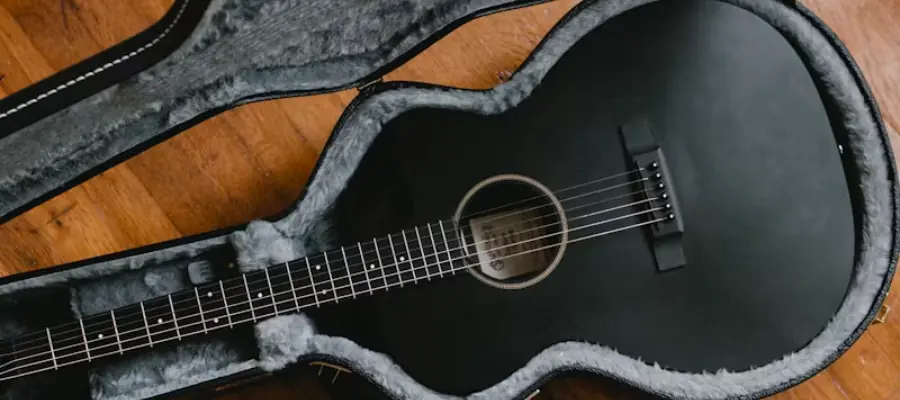Guitars are intricate instruments made of particular types of wood, steel, and electrical components, in the case of electric guitars. Considering these elements, you may wonder if water significantly threatens your guitar. Generally speaking, water is bad news for wooden objects and electricals, but is this true for guitars?
Guitars are not waterproof, so they can get damaged if they make contact with liquids. If this happens, wipe the water off immediately and inspect for damage. The guitar can be fine if the water stays on the outer part and doesn’t get inside the guitar or on the electronics and if you dry it quickly.
If you want to know more, stick around! I will explain what happens when guitars get wet and show you the potential damage acoustic and electric guitars can sustain from water. Moreover, I will include some useful tips on how to protect your guitar from water.
Are Guitars Waterproof?

Guitars are made of several different materials that can react differently when wet. If you want to take your guitar with you on the beach or play outdoors when it’s raining, you need to consider that your instrument may be ruined.
Generally speaking, guitars are not waterproof, as they can get damaged when they make contact with significant amounts of water. Depending on the type of guitar you’re playing and the amount of water on the instrument, you may be able to salvage your guitar if you’re quick.
Electric guitars are slightly better in this regard because most have a solid body, making them more resistant to water damage than hollow-body guitars. However, they have electrical components that may get damaged if they make contact with water. In most cases, you just need to quickly wipe the water off the guitar and ensure it is completely dry.
Acoustic guitars can sustain more damage from water. If water only reaches the surface of the top or back of the guitar, you may be able to just wipe it off quickly with no problem because the outer part of the guitar is made of sealed and finished wood, which is protected from moisture.
However, if the water gets inside the body of your guitar, it will be absorbed into the unfinished wood, which can render your instrument useless. Even the outside of your guitar is not entirely safe because certain finishes are less waterproof than others. Always wipe the water off the surface immediately to minimize the damage.
What Happens When a Guitar Gets Wet?

Water is one of the worst enemies of any wooden object, including guitars. When a guitar gets significantly wet, and you are not able to wipe it off as soon as you can, the water will be absorbed into the wood fibers of your guitar.
As a result, certain parts of your guitar will start to swell and may even rot with time. In some cases, the water will only damage the appearance of your guitar, but in others, it may affect your sound. For instance,
When an electric guitar gets wet, there’s an added risk of electrical parts getting damaged. When water gets inside these parts, it may cause them to short circuit on the spot or damage them enough to stop working sooner.
As soon as you notice your guitar is wet, take a soft, absorbent cloth and wipe the water off as well as you can. This may be enough if the water has only reached the wood; if you have reason to believe there is water inside the electrical parts, you must take your guitar apart and check every component.
In any situation, DON’T dry the guitar using heat. DON’T put it near a fireplace or use a hair blower. This can make things a lot worse and deform the wood, crack the finish, or even lose the glue on parts of the guitar.
Is It Risky To Play With a Wet Electric Guitar?
So far, I have only discussed what can happen to a guitar when it gets wet, but you may also be concerned about yourself in some particular scenarios. For instance, if you’re playing your plugged-in electric guitar and it starts raining or the instrument somehow gets wet, are you at risk as you make contact with it?
A wet electric guitar is not risky at all if it’s unplugged; it may get damaged, but it poses no risk to your health. However, if your electric guitar is plugged in and it gets wet, it becomes a potentially life-threatening issue. Water is a good electricity conductor, so you risk getting shocked or electrocuted when you’re playing a wet guitar in cases when the amp isn’t grounded properly.
If you’re outdoors in the rain or have any reason to believe that your electric guitar is wet, do not plug it in, and do not attempt to play it. Make sure your guitar is completely dry and safe before plugging it in.
How To Protect Your Guitar From Water

Sometimes, water can accidentally get on your guitar, and there’s nothing you can do, but other times, you can avoid such situations. Here are some tips to help you protect your instrument from water:
- Keep your guitar in a controlled environment. Find a dark and cool place where you can control the humidity and temperature to protect the wood.
- If you have to keep your guitar in a room with more humidity than you would like, get a dehumidifier to make sure your guitar stays dry enough.
- Keep your guitar inside a case. There are plenty of waterproof cases available that can help you protect your guitar when you’re not using it.
- If you don’t keep your guitar in a case, ensure it’s away from any windows. Rain coming from the window can cause irreparable damage to your guitar.
- Put moisture-absorbent materials inside the case to ensure your guitar is completely dry, like silica gel packets or activated charcoal. Replace these materials occasionally because they get useless once they absorb a certain amount of moisture.
Conclusions
Guitars can get wet, which is a major problem that can potentially render your instrument useless. Acoustic guitars are typically more likely to get damaged since they have hollow bodies with unfinished wood inside. However, electric guitars can also get damaged, especially if water enters the electrical components.
Keep your guitar in a controlled environment with a suitable temperature and humidity to protect it from water. Moreover, keep your guitar in a case to make sure it’s always protected, even if you’re not using it. If your guitar gets wet, wipe the water off immediately.
If you found this article useful, you may want to save this pin below to your Guitar board.

Recent Posts
Some guitarists insist on buying an expensive amplifier with their electric guitar. They assume that this is a must for every type of guitarist out there. However, in some situations, this isn’t...
Top 50 Free Realistic Guitar VST Plugins With Sound Examples
As technology has rapidly advanced in the recent decade, computers are stealing more and more roles from physical musical instruments and accessories. Nowadays, you do not need expensive amps,...

